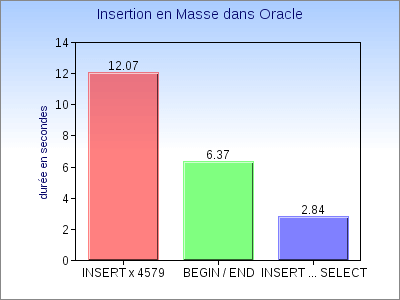
Optimize multiple INSERTs (for Oracle)
2020-02-04 #sql
In order to check the integrity of some data, I had to copy the contents of a large customer table from a DB2 database into an Oracle database. I know SQL*Loader exists, but this is not the time I'm gonna learn how to use it.
One INSERT command for each row to process
To begin with, I made tests with a subset of the data and tried to make it as simple as possible. So simple that I generated and executed one INSERT query per row to be inserted.
INSERT INTO MyTable (Column1, Column2, Column3) VALUES ('One_1', 'Two_1', 'Three_1');
then
INSERT INTO MyTable (Column1, Column2, Column3) VALUES ('One_2', 'Two_2', 'Three_2');
then
INSERT INTO MyTable (Column1, Column2, Column3) VALUES ('One_3', 'Two_3', 'Three_3');
etc...
=> 12.07 seconds to insert 4579 lines (i.e. 379 requests per second).
INSERT commands inside one BEGIN / END
Rather than making a connection.Execute() for each line, I grouped the INSERT commands into a BEGIN ... INSERT expression (a bit like a stored procedure) so as to hit the server for only one connection.Execute().
BEGIN
INSERT INTO MyTable (Column1, Column2, Column3) VALUES ('One_1', 'Two_1', 'Three_1');
INSERT INTO MyTable (Column1, Column2, Column3) VALUES ('One_2', 'Two_2', 'Three_2');
INSERT INTO MyTable (Column1, Column2, Column3) VALUES ('One_3', 'Two_3', 'Three_3');
etc...
END;
=> 6.37 seconds to insert 4579 lines => already twice as fast.
Note: with Dapper (and ADO.NET in general I suppose), Oracle doesn't support line breaks in the SQL command: I get an error @@PLS-00103: Encountered the symbol "" when expecting one of the following@.
To avoid this problem, just don't add a line break when generating the big query :
BEGIN INSERT INTO MyTable (...) VALUES (...); INTO MyTable (...) VALUES (...); ...; END;
An INSERT command from several SELECTs
This time, instead of making 1 access to the server to still make several INSERTs, I optimized even more by sending a single INSERT request. To do this, I turned "INSERT ... VALUES ..." into "INSERT ... SELECT FROM ..." :)
INSERT INTO MyTable (Column1, Column2, Column3)
SELECT ('One_1', 'Two_1', 'Three_1') FROM DUAL
UNION SELECT ('One_2', 'Two_2', 'Three_2') FROM DUAL
UNION SELECT ('One_3', 'Two_3', 'Three_3') FROM DUAL
etc...
=> 2.84 seconds to insert 4579 lines (i.e. 1612 requests per second) => 4 times faster.
Test results

It was useful to run a few tests, since it allows to go from 379 inserts in one second to more than 1600! And as I have nearly 300,000 lines to process, it will take 3 minutes and not 15 minutes.
Implementation
Actually, I copy the entire data with block of 500 customers to avoid overloading memory:
public int SaveCustomers(IEnumerable<Customer> customers)
{
var sql = @"UNION SELECT '{0}', '{1}', '{2}', '{3}', '{4}' FROM DUAL ";
int count = 0;
try
{
connexion.Open();
var batch = new StringBuilder();
foreach (var c in customers)
{
batch.Append(string.Format(sql, c.Agency, c.Code, c.Siret, c.Type));
count++;
if ((count % 500) == 0)
{
connexion.Execute(Sql_FromSelect(batch));
batch = new StringBuilder();
}
}
connexion.Execute(Sql_FromSelect(batch));
}
catch (Exception ex)
{
throw ex;
}
finally
{
connexion.Close();
}
return count;
}
private string Sql_FromSelect(StringBuilder batch)
{
// Au départ :
// "UNION SELECT '...', '...', '...', '...', '...' FROM DUAL UNION SELECT ... "
batch.Remove(0, 5);
// => " SELECT '...', '...', '...', '...', '...' FROM DUAL UNION SELECT ... "
var start = @"BEGIN INSERT INTO Customers (Agency, Code, Siret, Type) ";
batch.Insert(0, start);
// => "BEGIN INSERT INTO Customers (...) SELECT '...', '...', ... "
batch.Append("; END;");
// => "BEGIN INSERT INTO Customers (...) SELECT ... FROM DUAL; END;"
return batch.ToString();
}
Version en français : Optimiser les INSERT multiples (dans Oracle).